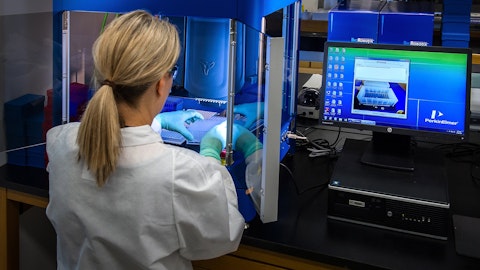Below we present the list of 5 Best NASDAQ Dividend Stocks To Buy. For our methodology and a more comprehensive list please see the 15 Best NASDAQ Dividend Stocks To Buy.
5. Starbucks Corporation (NASDAQ:SBUX)
Number of Hedge Fund Shareholders: 55
Dividend Yield: 2.43%
Starbucks Corporation (NASDAQ:SBUX) is hiking its next dividend payment by 8.2% to $0.53, which will be payable on November 23 and which has an ex-dividend date of November 9. Starbucks has raised its dividend each of the last 11 years, growing it at a CAGR of 14.41% over the past five years. Its payout ratio is a manageable 62%.
Stephens analyst Joshua Long initiated coverage of Starbucks in September, slapping an ‘Equal Weight’ rating and $91 price target on the shares. While he’s bullish on the company’s long-term success in the growing coffee market, he believes near-term headwinds in both the U.S. and China will pressure the company’s top line.
Hedge fund ownership of Starbucks Corporation (NASDAQ:SBUX) peaked during the first quarter of 2020 and has fallen by 22% since. Cathie Wood’s ARK Investment Management sold off her small stake in SBUX during Q3. Ray Dalio’s Bridgewater Associates held the largest Starbucks stake as of June 30, owning 3.24 million shares.
Polen Global Growth likes Starbucks Corporation (NASDAQ:SBUX)’s strong same-store sales, but is concerned about the cost pressures facing the company, as revealed in its Q2 2022 investor letter:
“Starbucks, which garners a lower weighting in the Portfolio, had slightly better than average three-month performance. Samestore sales were up double-digits in the U.S. and International exChina, with solid revenue growth across those regions. The company is experiencing cost pressures from wages and input costs though, and China same-store sales were down 23% due to zero-COVID policy restrictions and lockdowns.”
4. Texas Instruments Incorporated (NASDAQ:TXN)
Number of Hedge Fund Shareholders: 55
Dividend Yield: 3.07%
Texas Instruments Incorporated (NASDAQ:TXN) is raising its dividend by 7.8% to $1.24 beginning with its next payment on November 15, which had an ex-dividend date of October 28. The chipmaker has grown its dividend at a strong CAGR of 17.2% over the past five years and has a payout ratio of less than 50%.
While Texas Instruments isn’t being hit as hard as some chipmakers given its lighter exposure to the weakening PC market, the company’s earnings per share are still expected to slump by as much as 19% year-over-year in the fourth quarter due to broad weakness in the chip market. Analysts expect Texas Instrument’s earnings to slump by another 13% next year. With TXN shares at depressed levels and the company having very shareholder-friendly policies, it’s a dividend stock worth being bold on now.
Texas Instruments Incorporated (NASDAQ:TXN) has consistently ranked among the second tier of most popular stocks among hedge funds over the last five years, never cracking the top 30, but being comfortably within the top 100. First Eagle Investment Management and Ric Dillon’s Diamond Hill Capital both own substantial stakes in TXN as of June 30.
The Davis Opportunity Fund discussed the strong competitive position that semicondustor companies like Texas Instruments Incorporated (NASDAQ:TXN) have over their smaller rivals in the fund’s Q4 2021 investor letter:
“Within technology and communication services, we own a number of online businesses and semiconductor related companies, including Alphabet, Amazon, Intel, Applied Materials and Texas Instruments. Within the realm of high technology, we believe that leadership positions reflect enduring and widening competitive advantages over smaller competitors, with few exceptions. This is because online businesses, as well as semiconductor companies, benefit from economies of scale. An online search and advertising engine will, in general, be more profitable per unit of cost as it grows larger in terms of users and advertising dollars. It is a hub-and-spoke model, in other words, where it is generally not necessary to grow expenses at the same rate that revenues grow beyond a certain threshold. Therefore, returns on capital tend to be higher, the larger and more dominant the online search company is.”
3. Gilead Sciences, Inc. (NASDAQ:GILD)
Number of Hedge Fund Shareholders: 58
Dividend Yield: 3.68%
Gilead Sciences, Inc. (NASDAQ:GILD) hiked its quarterly dividend by just 2.8% this year to $0.73 as its dividend growth continues to slow. Given its solid yield and sub-50% payout ratio, it still looks to be an attractive pharmaceutical dividend stock for investors to diversify their portfolios with.
Gilead has more HIV treatments on the way with blockbuster potential, including Lenacapavir, which could more than make up for Truvada’s 2020 loss of exclusivity. That drug pulled in $2.6 billion in revenue in 2019, which had shrunk to just $34 million in Q2 of this year.
Formerly one of the 30 most popular stocks among hedge funds way back in 2016, smart money ownership of Gilead Sciences, Inc. (NASDAQ:GILD) has trended down in the years since to barely more than half the levels of six years prior. Peter Rathjens, Bruce Clarke, and John Campbell’s Arrowstreet Capital owns a sizable 15.7 million shares of GILD worth $968 million as of June 30.
The ClearBridge Investments Sustainability Leaders Strategy, which is invested in several major pharmaceutical companies, including Gilead Sciences, Inc. (NASDAQ:GILD), discussed the company’s controversial remdesivir in its Q4 2021 investor letter:
“Other pharma companies are providing solutions as well. Biopharmaceutical company Gilead Sciences’ remdesivir, sold under the brand name Veklury, is a broad-spectrum antiviral medication administered by intravenous infusion; it can shorten the time to recovery in hospitalized patients and reduce the risk of hospitalization and death in non-hospitalized patients.”
2. Cisco Systems, Inc. (NASDAQ:CSCO)
Number of Hedge Fund Shareholders: 63
Dividend Yield: 3.33%
Cisco Systems, Inc. (NASDAQ:CSCO) has an 11-year run of dividend growth, though that growth has slowed considerably in the past three years, with annual raises of just $0.04 in 2022 and 2021 and $0.05 in 2020. The good news is that Cisco shares already sport a nice dividend yield and the company’s payout ratio in less than 50%, so the shares should be assured of continued growth in the coming years. Cisco’s fiscal Q4 2022 adjusted earnings dipped 1% year-over-year, but the company’s expects between 4% and 6% growth in its fiscal year 2023.
Hedge fund ownership of Cisco Systems, Inc. (NASDAQ:CSCO) has remained remarkably steady over the years, as numerous funds continue to be bullish long-term shareholders of the company. Several major quant funds own large stakes in CSCO, including John Overdeck and David Siegel’s Two Sigma Advisors, Jim Simons’ Renaissance Technologies, and Cliff Asness’ AQR Capital Management.
The Carillon Eagle Growth & Income Fund expects strong demand for Cisco Systems, Inc. (NASDAQ:CSCO)’s routing and switching services, as detailed in the fund’s Q1 2022 investor letter:
“Cisco Systems (NASDAQ:CSCO) traded lower as investors weighed how supply chain concerns would impact sales growth. The company has been upgrading its switching and routing offerings, which should lead to strong demand as on-site locations upgrade infrastructure.”
1. Intel Corporation (NASDAQ:INTC)
Number of Hedge Fund Shareholders: 65
Dividend Yield: 5.02%
Topping the list is another chipmaker, Intel Corporation (NASDAQ:INTC), whose shares also boast the second-highest yield on this list at slightly more than 5%. The company hiked its dividend by 5% this year, about in line with its 6% CAGR over the past five years. With a payout ratio of less than 50%, Intel should be able to keep building on its 7-year run of dividend growth, even as it invests heavily in the company’s future.
Intel plans to slash its annual costs by as much as $10 billion by 2025, which would certainly help. Regardless, with nearly $25 billion in cash, the company can afford to fund its dividend for several years even if it’s failing to generate free cash flow, which will be the case this year, with the company’s FCF loss expected to be between $2 billion and $4 billion.
Since hitting an all-time high in hedge fund ownership during the first quarter of 2021, there’s been a 23% drop in the number of funds long Intel Corporation (NASDAQ:INTC) since, including a 13% drop during Q2. Of the funds that have filed their 13Fs for Q3 thus far, another two have unloaded their INTC stakes.
Baron Funds discussed Intel Corporation (NASDAQ:INTC)’s subpar net income growth over the past 22 years in the fund’s Q2 2022 investor letter:
“Then, there is the case of Intel Corporation (NASDAQ:INTC). A blue-chip tech champion with a market capitalization of over $500 billion in early 2000, the stock was trading at a P/E multiple of 42. It was a fast-growing company whose stock price and multiple declined more or less in line with its peers. However, unlike Google, Intel’s net income has grown from $7.3 billion in 1999 to $19.9 billion in 2021, a compounded annual growth rate of just 4.7%. Its growth from the dot com era has not proven to be durable, and Intel has yet to trade at the price it attained in 1999.”
For more of the latest stock picks worth considering for your portfolio, check out the 10 Best Fuel Stocks To Buy and the 10 Best Shipping and Container Stocks To Invest In.
Disclosure: None.





